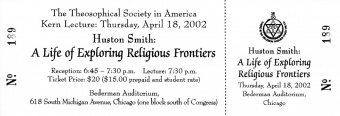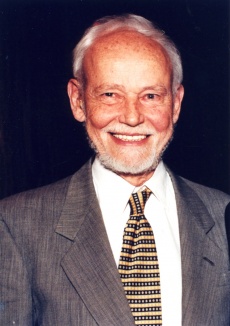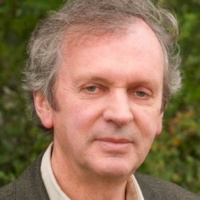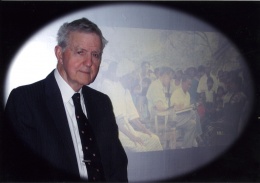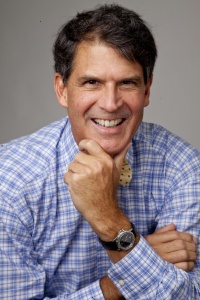Kern Lectures and Seminars: Difference between revisions
No edit summary |
No edit summary |
||
| Line 1: | Line 1: | ||
[[Category:History]] | [[Category:History]] | ||
[[Category:TS Adyar]] | [[Category:TS Adyar]] | ||
The '''Kern Lectures''' | The '''Kern Lectures''' are a series of public lectures sponsored by the [[Theosophical Society in America]] and funded by [[The Kern Foundation]]. Eminent scholars were invited to speak on subjects relevant to the Society and appealing to the general public. Public lectures at large venues are generally followed by day-long seminars at the [[Olcott (campus)|Olcott campus]]. | ||
[[File:Huston Smith ticket.jpg|right|340px|thumb|Ticket from first Kern Lecture]] | |||
[[File:Huston Smith.jpg|right|230px|thumb|Dr. Huston Smith]] | |||
== '''First Kern Lecture - Dr. Huston Smith''' == | == '''First Kern Lecture - Dr. Huston Smith''' == | ||
Dr. Smith is recognized as one of the greatest scholars of religion and bestselling author of ''The World's Religious: Our Great Wisdom Traditions''. In his Kern Lecture, he spoke on "A Life of Exploring Religious Frontiers" at Bederman Auditorium, Spertus College of Judaica, 618 S. Michigan Avenue, Chicago on Thursday April 18. According to the lecture announcement,<br><blockquote>Huston Smith will look back on his life in a "bookish autobiography" that uses his works to examine the often surprising and unpredictable causes and consequences of a life of religious exploration.</blockquote> | Dr. Smith is recognized as one of the greatest scholars of religion and bestselling author of ''The World's Religious: Our Great Wisdom Traditions''. In his Kern Lecture, he spoke on "A Life of Exploring Religious Frontiers" at Bederman Auditorium, Spertus College of Judaica, 618 S. Michigan Avenue, Chicago on Thursday April 18. According to the lecture announcement,<br><blockquote>Huston Smith will look back on his life in a "bookish autobiography" that uses his works to examine the often surprising and unpredictable causes and consequences of a life of religious exploration.</blockquote> | ||
The lecture was followed up with the '''First Kern Seminar''' on Saturday, April 20, on the topic, "Rediscovering Forgotten Truths." According to the program announcement,<ref> | The lecture was followed up with the '''First Kern Seminar''' on Saturday, April 20, on the topic, "Rediscovering Forgotten Truths." According to the program announcement,<ref>Publicity notices. Records Series 19.04. Kern Lectures Records. Theosophical Society in America Archives.</ref> | ||
<blockquote> | <blockquote> | ||
Prior to the rise of modern science, people believed in the existence of a world that encompassed and surpassed the everyday world that our physical senses disclosed. This "other world" housed values, meanings and purposes that later science could not understand. This workshop will inventory those values and expose the logical mistake that led modernity to conclude that they are not grounded in the ultimate nature of things thereby contradicting the | Prior to the rise of modern science, people believed in the existence of a world that encompassed and surpassed the everyday world that our physical senses disclosed. This "other world" housed values, meanings and purposes that later science could not understand. This workshop will inventory those values and expose the logical mistake that led modernity to conclude that they are not grounded in the ultimate nature of things thereby contradicting the unanimous testament of the world's wisdom traditions. The cost of this basic mistake will be noted; and the prospect that, after 300 years, we are finally beginning to correct it will be documented.<ref>Publicity notices. Records Series 19.04. Kern Lectures Records. Theosophical Society in America Archives.</ref> | ||
</blockquote> | </blockquote> | ||
[[File:Rupert Sheldrake.jpg|right| | [[File:Rupert Sheldrake.jpg|right|200px|thumb|Dr. Rupert Sheldrake]] | ||
== '''Second Kern Lecture - Dr. Rupert Sheldrake''' == | == '''Second Kern Lecture - Dr. Rupert Sheldrake''' == | ||
Dr. Rupert Sheldrake is Director of Studies in biochemistry and cell biology at Cambridge University, and author of numerous papers and books on morphic fields and mind/brain issues. His lecture was "The Extended Mind: Recent Experimental Evidence," delivered on Thursday, March 13, 2003, at Bederman Auditorium, 618 S. Michigan Avenue, Chicago. According to the program announcement, | Dr. Rupert Sheldrake is Director of Studies in biochemistry and cell biology at Cambridge University, and author of numerous papers and books on morphic fields and mind/brain issues. His lecture was "The Extended Mind: Recent Experimental Evidence," delivered on Thursday, March 13, 2003, at Bederman Auditorium, 618 S. Michigan Avenue, Chicago. According to the program announcement, | ||
<blockquote> | <blockquote> | ||
Most of us have been brought up to believe that the mind is located inside the head, but there are good reasons for thinking that this view is much too limited. Recent experimental results show that people can | Most of us have been brought up to believe that the mind is located inside the head, but there are good reasons for thinking that this view is much too limited. Recent experimental results show that people can influence others at a distance just by looking at them, even if they look from behind and if all sensory clues are eliminated. People's intentions can also be detected by animals from miles away. Recent experiments on telephone telepathy have given highly significant positive results. Rupert Sheldrake will show how his hypothesis of morphic fields could provide a new way of understanding the extended mind and of going beyond the usual mind/brain problem.<ref>Publicity notices. Records Series 19.04. Kern Lectures Records. Theosophical Society in America Archives.</ref> | ||
</blockquote> | </blockquote> | ||
The lecture was followed up with the '''Second Kern Seminar''' on Saturday, April 20, on the topic, "Rediscovering Forgotten Truths." According to the program announcement, | The lecture was followed up with the '''Second Kern Seminar''' on Saturday, April 20, on the topic, "Rediscovering Forgotten Truths." According to the program announcement, | ||
<blockquote> | <blockquote> | ||
In the philosophies of the classical world and of the Middle Ages, souls were the life principles of all living beings, including plants and animals - and even of magnets. Ever since field concepts were first | In the philosophies of the classical world and of the Middle Ages, souls were the life principles of all living beings, including plants and animals - and even of magnets. Ever since field concepts were first introduced into science in the 1840s, fields have come to take on more and more of the traditional explanatory role of souls. The idea of morphogenetic fields, first proposed in the 1920s, sheds light on the processes of physical healing and regeneration. Behavioral, mental and social fields provide a holistic insight into many biological, psychological, and social phenomena. All such fields can be thought of as morphic fields, with an inferent memory given by the process of morphic resonance. Dr. Sheldrake will discuss some o the evidence for this hypothesis and its implications and show how participants can carry out simple experiments for themselves.<ref>Publicity notices. Records Series 19.04. Kern Lectures Records. Theosophical Society in America Archives.</ref> | ||
</blockquote> | </blockquote> | ||
[[File:Ian Stevenson.jpg|right| | [[File:Ian Stevenson.jpg|right|260px|thumb|Dr. Ian Stevenson]] | ||
== '''Third Kern Lecture - Dr. Ian Stevenson''' == | == '''Third Kern Lecture - Dr. Ian Stevenson''' == | ||
Dr. Ian Stevenson, MD, was a Research Professor of Psychiatry at the University of Virginia School of Medicine. He had an illustrious academic career spanning 50 years, | Dr. Ian Stevenson, MD, (1918-2007) was a Research Professor of Psychiatry at the University of Virginia School of Medicine. He had an illustrious academic career spanning 50 years, in which he traveled the world to investigate and document over 2000 cases of past life memories. | ||
On September 23, 2004, he gave an illustrated talk on "Children Who Claim to Remember Previous Lives." Like the previous Kern Lectures, this was held at Bederman Auditorium in Chicago. | On September 23, 2004, he gave an illustrated talk on "Children Who Claim to Remember Previous Lives." Like the previous Kern Lectures, this was held at Bederman Auditorium in Chicago. This was the first lecture that Dr. Stevenson had ever given to a non-academic audience, and 180 people were in attendance. | ||
On the following Saturday, September 25, he presented the '''Third Kern Seminar''' on "Evidence for Life After Death: Apparitions, Dearth Bed Visions, and More." Sixty people attended. | On the following Saturday, September 25, he presented the '''Third Kern Seminar''' on "Evidence for Life After Death: Apparitions, Dearth Bed Visions, and More." Sixty people attended. | ||
[[File:Eben Alexander.jpg|right|200px|thumb|Dr. Eben Alexander]] | |||
== '''Fourth Kern Lecture - Dr. Eben Alexander''' == | |||
== Recordings of lectures == | |||
These lectures are recorded by audiovisual staff of the Theosophical Society in America, and are available through the [[Henry S. Olcott Memorial Library]] and through the [[Quest Books|Quest Books]] [https://questbooks.com/ website]. | |||
== Notes == | == Notes == | ||
<references/> | <references/> | ||
Revision as of 15:41, 19 May 2016
The Kern Lectures are a series of public lectures sponsored by the Theosophical Society in America and funded by The Kern Foundation. Eminent scholars were invited to speak on subjects relevant to the Society and appealing to the general public. Public lectures at large venues are generally followed by day-long seminars at the Olcott campus.
First Kern Lecture - Dr. Huston Smith
Dr. Smith is recognized as one of the greatest scholars of religion and bestselling author of The World's Religious: Our Great Wisdom Traditions. In his Kern Lecture, he spoke on "A Life of Exploring Religious Frontiers" at Bederman Auditorium, Spertus College of Judaica, 618 S. Michigan Avenue, Chicago on Thursday April 18. According to the lecture announcement,
Huston Smith will look back on his life in a "bookish autobiography" that uses his works to examine the often surprising and unpredictable causes and consequences of a life of religious exploration.
The lecture was followed up with the First Kern Seminar on Saturday, April 20, on the topic, "Rediscovering Forgotten Truths." According to the program announcement,[1]
Prior to the rise of modern science, people believed in the existence of a world that encompassed and surpassed the everyday world that our physical senses disclosed. This "other world" housed values, meanings and purposes that later science could not understand. This workshop will inventory those values and expose the logical mistake that led modernity to conclude that they are not grounded in the ultimate nature of things thereby contradicting the unanimous testament of the world's wisdom traditions. The cost of this basic mistake will be noted; and the prospect that, after 300 years, we are finally beginning to correct it will be documented.[2]
Second Kern Lecture - Dr. Rupert Sheldrake
Dr. Rupert Sheldrake is Director of Studies in biochemistry and cell biology at Cambridge University, and author of numerous papers and books on morphic fields and mind/brain issues. His lecture was "The Extended Mind: Recent Experimental Evidence," delivered on Thursday, March 13, 2003, at Bederman Auditorium, 618 S. Michigan Avenue, Chicago. According to the program announcement,
Most of us have been brought up to believe that the mind is located inside the head, but there are good reasons for thinking that this view is much too limited. Recent experimental results show that people can influence others at a distance just by looking at them, even if they look from behind and if all sensory clues are eliminated. People's intentions can also be detected by animals from miles away. Recent experiments on telephone telepathy have given highly significant positive results. Rupert Sheldrake will show how his hypothesis of morphic fields could provide a new way of understanding the extended mind and of going beyond the usual mind/brain problem.[3]
The lecture was followed up with the Second Kern Seminar on Saturday, April 20, on the topic, "Rediscovering Forgotten Truths." According to the program announcement,
In the philosophies of the classical world and of the Middle Ages, souls were the life principles of all living beings, including plants and animals - and even of magnets. Ever since field concepts were first introduced into science in the 1840s, fields have come to take on more and more of the traditional explanatory role of souls. The idea of morphogenetic fields, first proposed in the 1920s, sheds light on the processes of physical healing and regeneration. Behavioral, mental and social fields provide a holistic insight into many biological, psychological, and social phenomena. All such fields can be thought of as morphic fields, with an inferent memory given by the process of morphic resonance. Dr. Sheldrake will discuss some o the evidence for this hypothesis and its implications and show how participants can carry out simple experiments for themselves.[4]
Third Kern Lecture - Dr. Ian Stevenson
Dr. Ian Stevenson, MD, (1918-2007) was a Research Professor of Psychiatry at the University of Virginia School of Medicine. He had an illustrious academic career spanning 50 years, in which he traveled the world to investigate and document over 2000 cases of past life memories.
On September 23, 2004, he gave an illustrated talk on "Children Who Claim to Remember Previous Lives." Like the previous Kern Lectures, this was held at Bederman Auditorium in Chicago. This was the first lecture that Dr. Stevenson had ever given to a non-academic audience, and 180 people were in attendance.
On the following Saturday, September 25, he presented the Third Kern Seminar on "Evidence for Life After Death: Apparitions, Dearth Bed Visions, and More." Sixty people attended.
Fourth Kern Lecture - Dr. Eben Alexander
Recordings of lectures
These lectures are recorded by audiovisual staff of the Theosophical Society in America, and are available through the Henry S. Olcott Memorial Library and through the Quest Books website.
Notes
- ↑ Publicity notices. Records Series 19.04. Kern Lectures Records. Theosophical Society in America Archives.
- ↑ Publicity notices. Records Series 19.04. Kern Lectures Records. Theosophical Society in America Archives.
- ↑ Publicity notices. Records Series 19.04. Kern Lectures Records. Theosophical Society in America Archives.
- ↑ Publicity notices. Records Series 19.04. Kern Lectures Records. Theosophical Society in America Archives.
